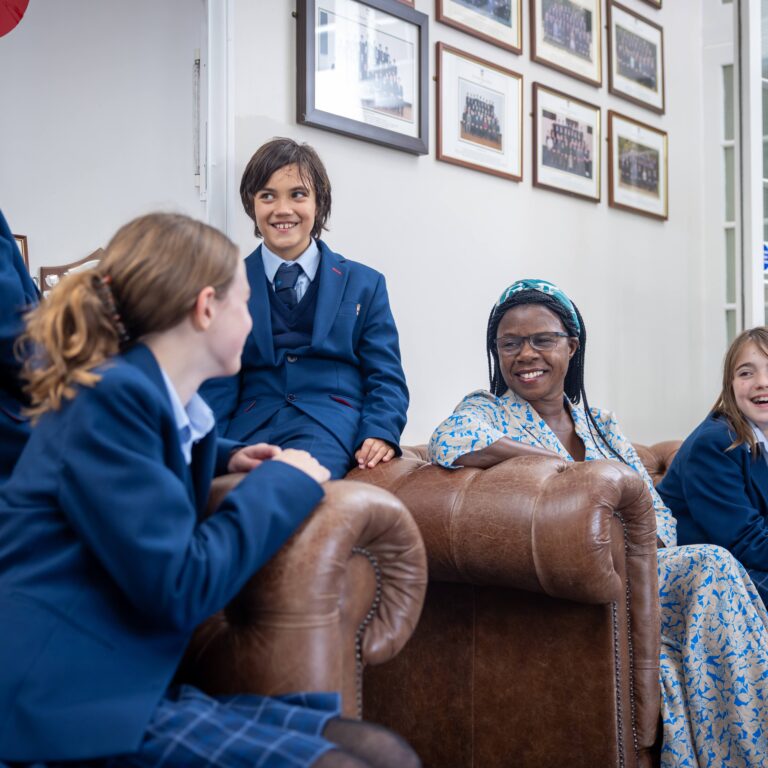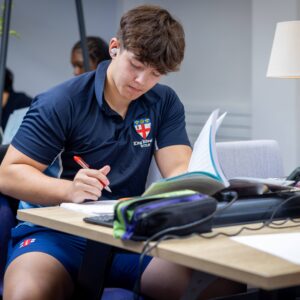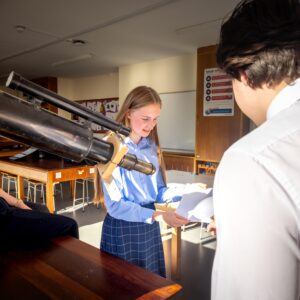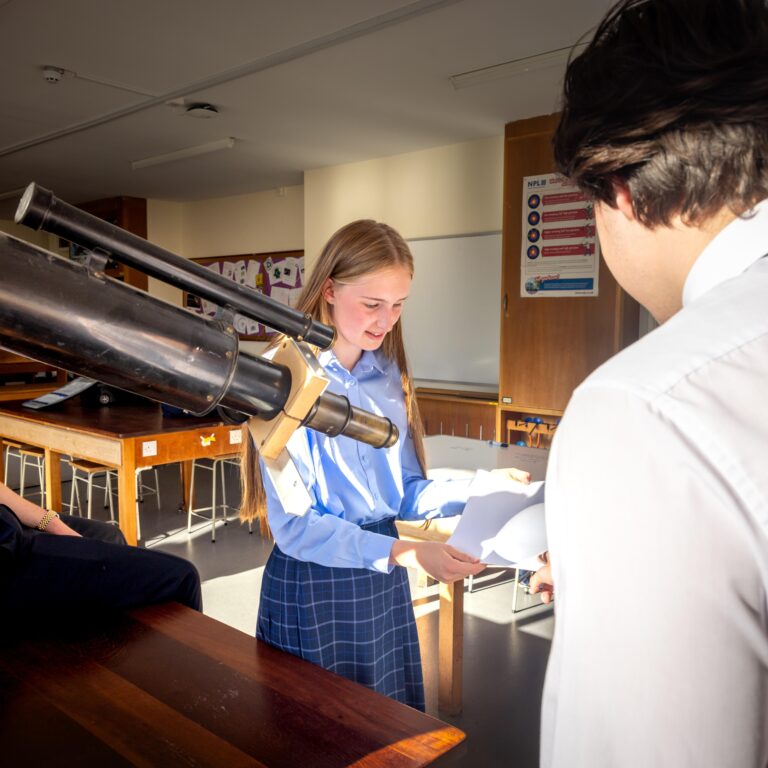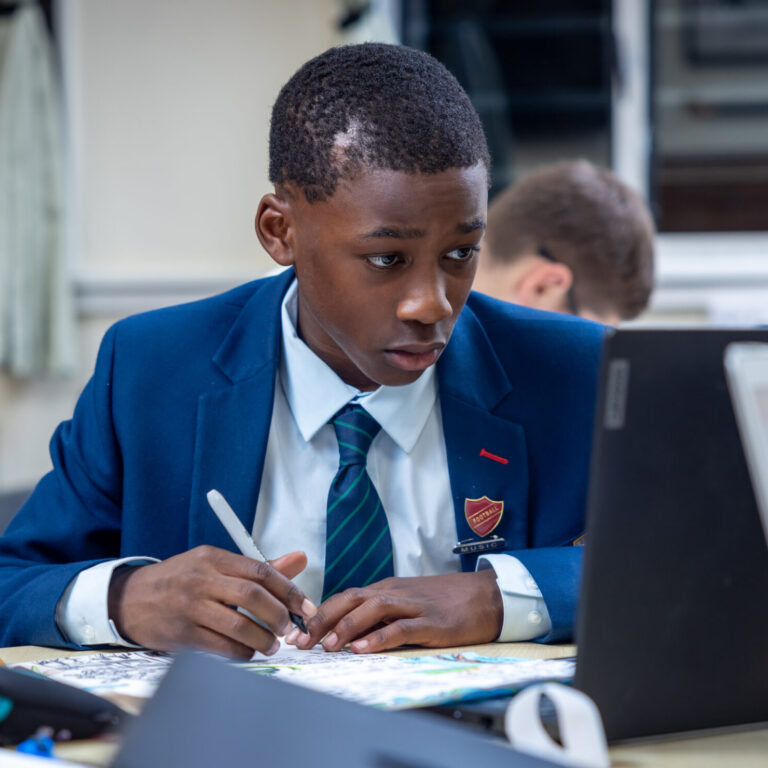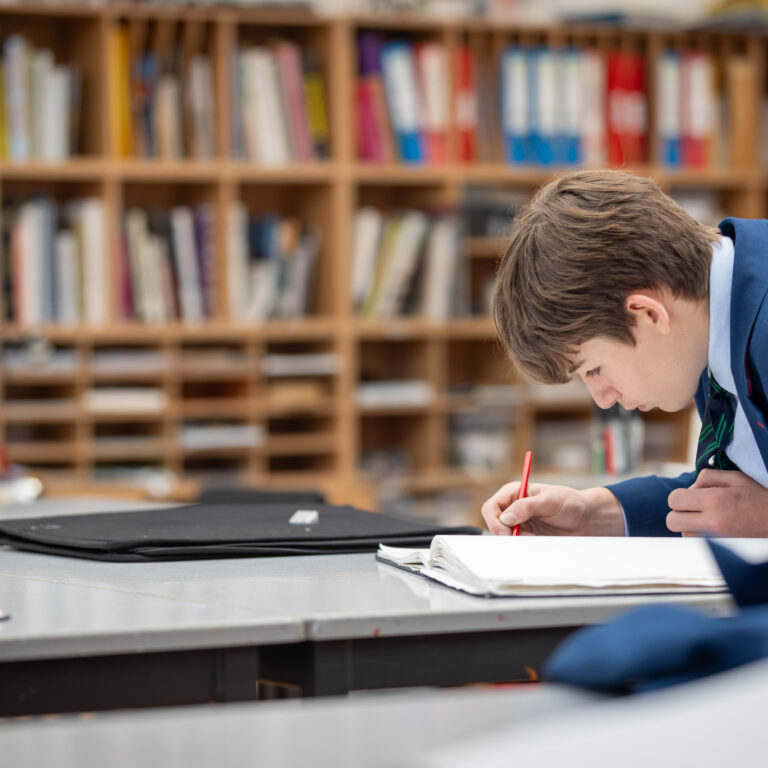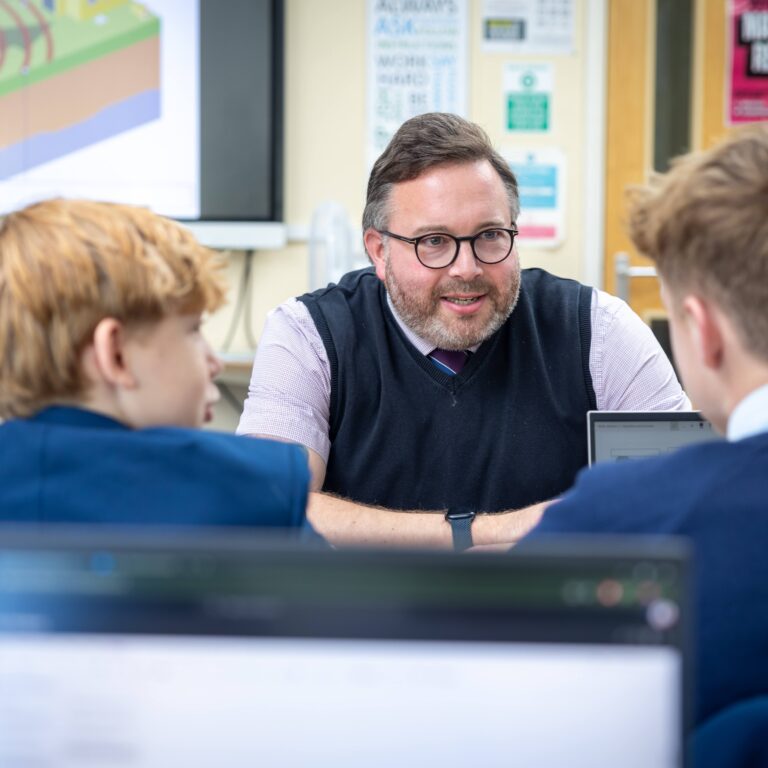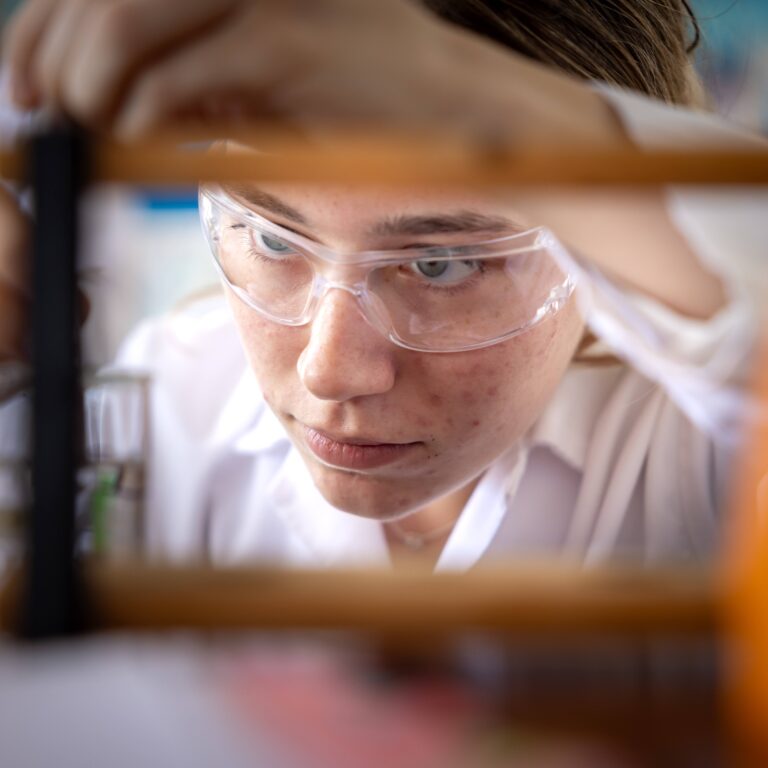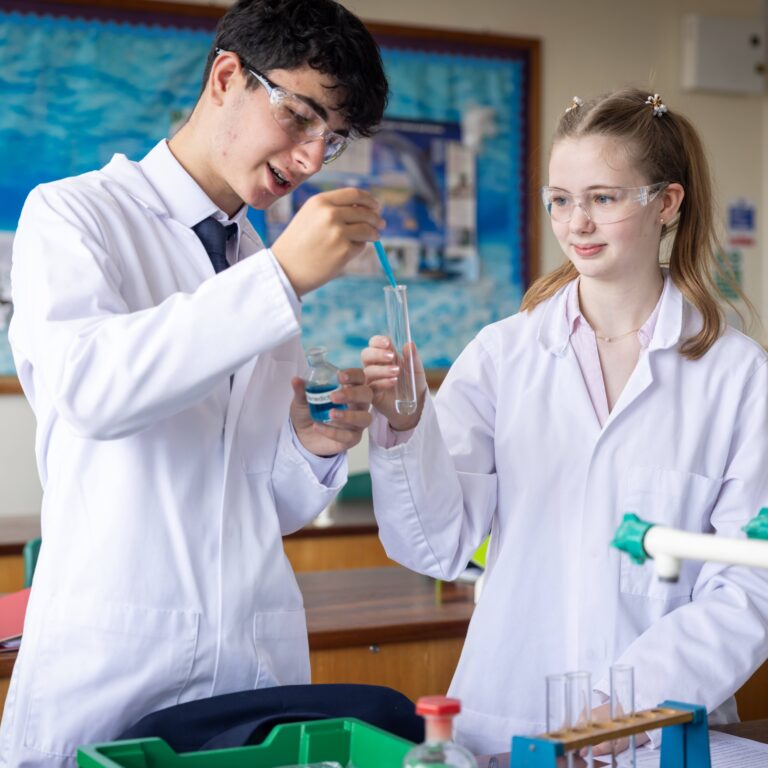Individualised journeys shaping academic excellence
Years 9, 10 and 11 (our 3rd 4th and 5th Form) are key formative years in pupils educational journeys, and academic excellence is promoted and facilitated through a strong emphasis on individual learning. Our commitment to the holisitic development of each individual allows pupils to build on their previous learning foundations with a continued breadth of academic study and co-curricular activities designed to develop teamwork and leadership skills, as well as igniting a lifelong passion for learning. This breadth helps ensure all pupils are empowered to complete a varied, balanced programme of studies, having made informed decisions about their optional GCSE subjects from the wide range available.
Individual growth is central to the academic journey of pupils at King Edward’s. Through continuous monitoring, support, guidance and feedback, we empower pupils to take responsibility for their own learning and be confident in taking academic risks within it, confident in the knowledge that the support network around them will turn every misstep into a learning opportunity. Our pupils benefit from small classes with a high level of individualised interaction across all academic departments, expediting opportunities for scholarship and academic challenge which motivate and equip our pupils to achieve beyond their own expectations.
Pupils typically take 9 GCSEs; most progress to A levels, or alternatively take BTEC/level 3 programmes in Food Technology, Music or Sport Science. We offer academic scholarships, and specialist scholarships in Sport, Drama, Music, Art and Design Technology, to pupils identified during our admissions process. In 2024, 7 in 10 of our pupils achieved A* – B grades in A levels, and half of all grades at GCSE were at grade 7 or above (A*/A).
Beyond the classroom, each of our pupils receives extensive academic support and has weekly assemblies and tutorials where their tutor provides frequent academic feedback, shaping and guiding strategies around revision and examination skills, executive function and individual action plans for academic progress. Parents use our parent portal to access regular progress updates, grades and written reports and benefit from open channels of communication with tutors, teachers and house staff, in addition to our parent/staff conference programme.
3rd Form (Year 9) and GCSE Curriculum
Our GCSE programme includes core subjects – Maths, English (Language and Literature), and double Science, with our keenest scientists taking triple Science. Our pupils take an additional four GCSEs from the options below:
Art, Classical Civilisation, Computing, Drama, a Modern Foreign Language, Geography, History, Latin, Music, Physical Education, Religious Studies, Design Technology or Food Technology).
GCSE option blocks are created to meet the choices of each pupil, within balanced programmes designed to lead to the broadest future career and study options possible. Pupils select their GCSE subjects in consultation with teachers, House staff and their parents and guardians.
All of our pupils also follow a non-examined course in Personal, Social, Health and Economic (PSHE) which complies with statutory guidance on the delivery of sex, health, financial and citizenship education, as well as Critical Thinking, PE and Games
GCSE /IGCSE results 2024
Subjects graded 9-7 (A* – A): = 47%
Subjects graded 9-6 (A* – B) = 66%
GCSE Options 2025-2026
As our pupils look ahead to their GCSE programmes, they are able to personalise their curriculum and further develop their knowledge, skills and understanding in their preferred areas. Individualised support is provided, with our subject guides aiming to provide information to allow informed choices, in collaboration with teachers, tutors, the Head of Careers and Higher Education, and parents and guardians.
If prospective numbers are not significant to provide the learning environment needed for our pupils to thrive in any subject, we may withdraw the subject. Pupils wishing to study a subject not currently offered are also encouraged to reach out to the Deputy Head, Academic. Every effort is made to accommodate all learning patterns; pupils are informed at the earliest possible opportunity in the rare event of timetabling challenges around their choices.
FAQ
When will we find out more about GCSE options? Who should we contact?
We will be delivering a presentation on the GCSE options process at the Parent’s Conference on Tuesday 21stJanuary 2025 and Thursday 23rd January 2025. Given the length of the evening, we will be running this at both 17:00-17:30 and 18:30-19:00 in the Gerald Coke Pentagon. Our GCSE options booklet will be available at the Parents’ Conference and is also available on our website. We are offering the same GCSE and IGCSE courses as last year, plus a new option; Art – Textiles. If you do have questions about (I)GCSE options, please contact your child’s tutor in the first instance, and you may wish to contact subject teachers and Heads of Department.
What is the deadline for submitting GCSE/IGCSE option choices?
You can access the GCSE/IGCSE Options Form on Firefly. This will need to be submitted no later than 9am on Monday 3rd February 2025. It is possible to make changes, subsequently, however these initial choices are used to design the curriculum and ensure that as many pupils as possible are able to study their chosen combinations of subjects.
How Many GCSES can our children study and how Many options do they have?
Most of our pupils take nine GCSE/IGCSE subjects. Our core subjects consist of English Language and Literature (two qualifications), Maths, and Double Science (or Triple Science for the top set). That leaves most pupils free to choose an additional 4 optional subjects which they are asked to submit, together with a reserve choice in case there are any timetable clashes. Any pupils that wish to be considered for Triple Science must indicate and select ‘Triple Science’ as one of their options.
How much coursework is there for practical subjects, such as art?
This varies from subject to subject. Art, for example, is moderated and examined based on a complete portfolio which counts for 60% and a practical exam which counts for 40%, and other subjects require portfolios or practical elements that are worth between 40-60% of the final grade.
Is there any way of taking additional GCSE qualifications?
We offer the Additional Maths course to our most able pupils in top set Maths, based on their performance during the 4th Form. Pupils study for both the Maths IGCSE taken by all pupils and Additional Maths which is a separate qualification.
Music scholars who have completed Grade 5 theory are able to complete IGCSE Music as an additional 10th GCSE completed through a combination of Saturday workshops and after school sessions that augment their peripatetic music classes.
Now that so many pupils are using laptops extensively, will they be able to sit public exams using laptops?
There are some schools where all pupils sit their public examinations using laptops. This is a whole-school decision, and we feel it needs to be supported by a targeted course to ensure that all pupils can touch type effectively. Currently, we do not have plans to take this route, and we do ask pupils to maintain their handwriting, particularly as we are aware of research which suggests that pupils who take handwritten notes perform better in public exams. We aim to continue balancing use of laptops with ensuring that pupils can write well by hand.
Academic Scholarship & Learning Support
We seek to promote a scholarly mindset amongst all our pupils and encourage them to take advantage of the extensive array of enrichment opportunities available to them, whether they are an Academic Scholar or not. This mindset, drive and passion for learning stands our pupils in good stead in developing knowledge, skills and conceptual understanding, combined with a strong set of values, to become confident, independent and proactive learners able to make a positive contribution to society.
